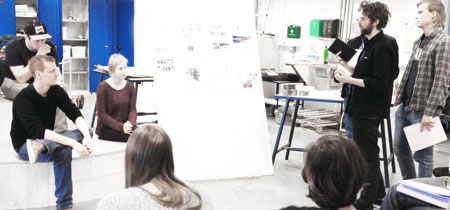Sustainable Design is a popular
cross-disciplinary profile

Study programs
Creative engineer with social responsibility? Do you dream of designing energy-efficient welfare technology, sustainable products and systems for the benefit of this and the coming generations? Would you like to help businesses and public organizations adapting to future climate change?
Climate Challenges and a threatened environment means that both sustainability and innovative functionality must be incorporated into new products and systems. In the Sustainable Design Programme you will be an expert in creating and implementing sustainable products and systems working closely with companies, municipalities and NGOs. You develop e.g first aid tents, new systems for rehabilitation of elderly, transport technologies or products for households with focus on changing consumption patterns.
A popular cross-disciplinary profile
With a degree in Sustainable Design, you get a cross-disciplinary education with skills within project management, prototype development and conceptualization of creative design disciplines. You will learn to analyze different use practices and how we act in different cultural and social contexts. You also get skills in more technical engineering disciplines as mechanics, mathematics, energy conversion and data handling. With this combination of skills you will as an engineer be able to be part of the multidisciplinary reality the industry is in demand of.
Sustainable Design Programme creates engineers of the future
"The need for sustainable design is evident when our society is fundamentally based on a non-sustainable use of natural resources that we transform to waste and pollution. Positive visions are essential to ensure support for us to handle the complex challenges and barriers we meet in the transition processes towards a more sustainable society. Sustainable design has to be developed in collaboration with external partners and must combine elements from the technical, the humanities and the social sciences to find the answers to how we establish the transition processes."
Claus Stig Pedersen, Senior Director, Head of Sustainability Development, Novozymes
"Center for Innovation and Research, is a center where people from all parts of the health care system in the Capital Region in Denmark can gain knowledge and consultancy on research and innovation. In the Center, we believe that products and systems aimed at health care, both should take into account the environmental and user involvement challenges we face. We see the Sustainable Design Programme as an interesting and relevant training, as the programme in addition to creating engineers who have solid knowledge in sustainable development processes, also will be able to collaborate across different professional areas. This gives the students an insight and knowledge in both the needs of different users, and in organizational change processes that can be required to make sure that implementing a solution can be successful."
Susie Andersen Ruff, Device Manager, Centre for Innovation and Research
"InnoAid is an international non-profit NGO that aims to develop and implement innovative and sustainable solutions together with the locals in the developing countries. The Sustainable Design Programme is highly relevant, as it focuses on how relevant actors are actively involved in the development process, creating both insight and ownership. Especially when working in developing countries, it is important to have a thorough understanding of users, the context and the system, within which the solution is going to work. If a solution is to be a success both during and after implementation, it is important that the solution takes into account the often very different local values and needs and that the locals/users gets ownership of the system and skills to maintain it after implementation. We look forward to work with students from ’Sustainable Design’ at AAU Copenhagen in the future, in the form of guidance and projectwork with possibility of exciting field work in a number of developing countries."
Marie Louise M. Larsen, President, InnoAid
“Sustainable Design answers an important need for engineers who can develop and realize long-term and sustainable welfare. It is crucial to enable engineers to influence the multidisciplinary scenery of current organizational settings where every day decision-making has to meet the challenges of realizing sustainable, global and societal transition. In Ernst & Young’s Cleantech programme we work with Henning Larsen Architects to promote sustainable building design strategies. This requires an interdisciplinary approach and the future need for engineers with such competences is obvious.”
Nils Thorsen, Senior Manager, Ernst & Young
The Programme Accreditation, read more here